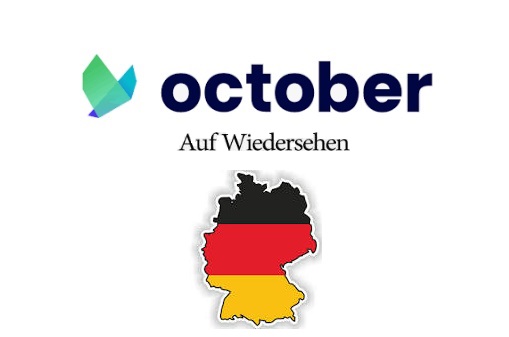Feedback: why October is folding its business in Germany

When October launched its alternative lending business in Germany in 2019, it was based on the fact that this business was not well developed in Germany and that no player had yet emerged. The structure of the German market, with its large number of SMEs and SMIs, also made it a promising market. However, this was without taking into account the specificity of the regional banks, nor the tightening of financing conditions which are combined with the economic crisis.
FACTS
-
Germany is a relatively overbanked country with over 1600 banks, mainly divided between two large regional organisations. The challenge for these banks is digitalisation: they are struggling to keep up with regulatory changes and their development has not kept pace with the changing needs of their customers.
-
There are a few dedicated alternative finance platforms for SMEs in Germany, including Auxmoney, Creditshelf, Funding Circle and Kapilendo [now Invesdor]. 11.4 billion in 2021, according to the Association of German Lending Platforms (VdK), which is very small compared to the total market volume of
-
It is in this context that October, after two years of presence on the German market, has taken the decision to withdraw and stop its direct activity there. It will now focus on its business in partnership with other fintechs.
-
The fintech only managed to transform 78 credit projects out of the 3,518 financed by October in Europe, for a total amount of nearly 812 million euros.
-
Finally, it should be noted that Germans are very price sensitive. They usually focus on the most visible costs, namely the interest rate. As a result, bank loans in Germany generally benefit from very low interest rates and bank margins are therefore low.
CHALLENGES
-
A very specific regional context: The German SME market is an attractive (3.5 million SMEs) but difficult market. Indeed, German SMEs are still very little digitised. They are also very tied to their local bank in the relationship. It is therefore difficult to acquire new customers, a difficulty that October, which mainly targets companies with a turnover of less than €20m, has encountered. The other major obstacle to entering the German market is its regulatory framework; the country has introduced specificities that go beyond European legislation on data protection (RGPD) or money laundering, two factors that have complicated the task of the French fintech.
-
A return to embedded finance for October: In Germany, its services will now only be offered through the software interface of its partners (APIs), neo-banks, such as Qonto or Agicap or other companies targeting SMEs. With an embedded finance model, October also gets around the regulatory hurdle.
MARKET PERSPECTIVE
-
In June, October, as the French market leader, acquired its competitor Credit.fr from investment fund Tikehau Capital. Credit.fr is the second largest lending platform for French SMEs in terms of volume. The new entity will represent more than 860 million euros lent to 3,100 European companies.
-
The rapid digitalisation of German SMEs is also attracting factoring players such as fintechs Billie and Mondu, which recently raised funds from major players to digitalise this BtoB fractional payment business.
-
Other French players have encountered the same difficulties on the German market. This is the case, for example, of Qonto, which also targets SMEs. In order to establish itself on a long-term basis in Germany, it bought Penta, its main competitor, which was already very well established with this target group.
